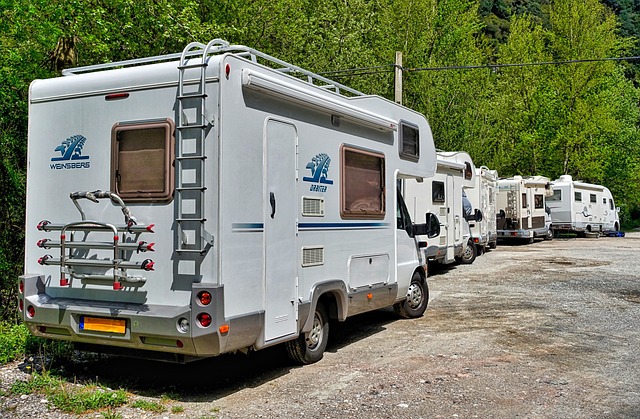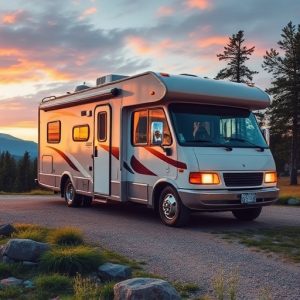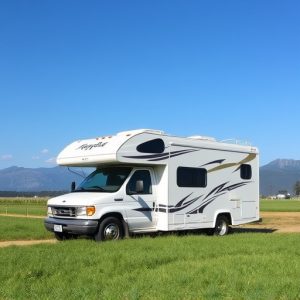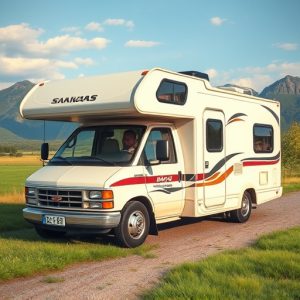RV Budgeting Essentials: Maximizing Your Travel Dollar on the Open Road
When embarking on an RV journey, financial planning is essential for a comfortable and cost-effectiv…….

When embarking on an RV journey, financial planning is essential for a comfortable and cost-effective trip. Key expenses include RV acquisition, insurance, storage, fuel, camping fees, and daily living costs. To manage these effectively, utilize RV Travel Tips such as joining membership clubs for discounts, considering off-season travel, and taking advantage of free or low-cost campsites. Strategic route planning that includes scenic byways can balance beauty with economy, and using budgeting tools to track expenses in real-time will help you stay on course. Be mindful of regional cost differences and plan for less expensive destinations. Cooking inside the RV and being aware of spending allow for both savings and home comforts. A slush fund for unexpected costs and the flexibility to adjust plans as needed ensure that your RV trip remains enjoyable and within budget, enhancing the overall travel experience with RV Travel Tips that promote smart financial management.
Embarking on an RV journey offers unparalleled freedom and adventure, but smart budgeting is key to maximizing your experience without overextending your finances. This comprehensive guide to budgeting for RV travel will navigate you through pre-trip cost considerations, strategic route planning, camping on a budget, and managing daily spending effectively. With our RV Travel Tips, you’ll ensure a well-planned expedition that balances the beauty of the open road with the practicality of your wallet. Let’s hit the highway with wisdom at the wheel and memories in the tank.
- Crafting Your RV Travel Budget: A Comprehensive Guide for Maximizing Your Journey
- Pre-Trip Cost Considerations: Expenses to Anticipate Before Hitting the Road
- Strategic Route Planning: Balancing Scenic Routes and Fuel Economy
- Camping on a Budget: Finding Affordable Stays and Utilizing Membership Programs
- Managing Daily Spending While on the Road: Tips for Keeping Track of Everyday Expenditures
Crafting Your RV Travel Budget: A Comprehensive Guide for Maximizing Your Journey

Embarking on an RV travel adventure requires meticulous planning, especially regarding your budget. To maximize your journey and ensure financial prudence, it’s crucial to craft a comprehensive budget that accounts for all potential expenses. This guide offers RV Travel Tips tailored for those looking to optimize their spending while enjoying the open road.
Your budget should start with fixed costs, such as RV payments, insurance, and any storage fees if you’re not using your RV year-round. Next, consider your travel frequency and duration to estimate fuel expenses, which can be a significant portion of your budget. Beyond these expected costs, allocate funds for campground stays, ranging from public lands with minimal fees to private RV parks that may charge premium rates. Additionally, factor in daily living expenses like groceries, dining out, and entertainment. To stretch your travel dollars further, research membership clubs that offer discounts on camping, and take advantage of free or low-cost campsites. With a detailed budget in place, you can focus on the joys of RV travel without the added stress of financial overextension. RV Travel Tips suggest considering off-season travel for better rates and exploring less-traveled routes to reduce wear and tear on your vehicle, saving on maintenance costs in the long run.
Pre-Trip Cost Considerations: Expenses to Anticipate Before Hitting the Road

When embarking on an RV travel adventure, careful financial planning is key to ensuring a memorable and stress-free journey. Before hitting the road, potential RV travelers should account for various costs that will contribute to the overall budget of their trip. One of the initial expenses to consider is the purchase or rental of the RV itself. Depending on the type of RV, its age, size, and condition, costs can vary significantly. It’s also wise to factor in maintenance and potential repair costs; unexpected mechanical issues are not uncommon and can be costly. Insurance for your RV is another critical expense, offering protection against accidents, theft, or natural disasters.
In addition to the RV, travelers must consider campground fees, which can range from a simple spot in a state park to premium rates at private RV resorts. Advanced booking for popular destinations during peak seasons can drive up these costs, so it’s advisable to plan and reserve your spots well in advance. Additionally, don’t forget to account for daily living expenses such as groceries, fuel, propane refills, and dump station usage. Budgeting for entertainment, attractions, and dining out occasionally will also enhance your trip without causing budgetary strain. With thoughtful planning and attention to these pre-trip cost considerations, RV travelers can set forth on their journey with the confidence that they have anticipated and prepared for the financial aspects of their adventure, making the most of their RV travel experience following the RV Travel Tips outlined here.
Strategic Route Planning: Balancing Scenic Routes and Fuel Economy

When embarking on an RV travel adventure, strategic route planning is key to maximizing your experience while keeping costs manageable. To enhance your journey with breathtaking views, consider incorporating scenic routes into your itinerary; however, these often come with terrain that can reduce fuel efficiency. A balance must be struck between the awe-inspiring vistas of America’s heartland and the economic realities of fuel costs. Utilize RV travel tips that recommend mapping out your route ahead of time, taking into account both the beauty you wish to behold and the proximity of gas stations along your path. Fuel economy can be significantly impacted by factors such as elevation changes, road type, and distance. Employing GPS systems or Route 66 RV-specific maps can help optimize your journey for fuel savings while still allowing you to enjoy the country’s diverse landscapes. By carefully planning your route and being mindful of your vehicle’s capabilities, you can create a travel plan that provides both a memorable trip and cost savings at the pump. With a little preparation and the right tools, your RV can carry you on an unforgettable journey without breaking the bank.
Camping on a Budget: Finding Affordable Stays and Utilizing Membership Programs

When embarking on an RV travel adventure, budget-conscious explorers can maximize their experience by carefully selecting affordable camping options and leveraging membership programs designed for RVers. To start, research state and national parks, as they often offer a range of campsites at significantly lower rates compared to private campgrounds. Many of these public lands provide breathtaking natural beauty and unique experiences without the premium price tag. Additionally, federal land management agencies like the US Forest Service and the Bureau of Land Management offer free or low-cost dispersed camping opportunities, allowing travelers to immerse themselves in nature while keeping costs down.
Another effective way to save on RV travel is by joining membership programs that offer discounts at participating campgrounds across the country. Clubs such as Passport America and Good Sam Club provide substantial savings when you stay at their network of partner campgrounds, often offering up to 50% off your nightly rate. These memberships can quickly pay for themselves with just a few nights’ stay, making them an invaluable resource for RVers looking to stretch their travel budget further. By combining the use of public lands and strategic membership program enrollment, RV travelers can enjoy the open road without overspending, ensuring that their journey is both memorable and financially responsible.
Managing Daily Spending While on the Road: Tips for Keeping Track of Everyday Expenditures

When embarking on an RV travel adventure, managing daily spending is crucial to ensuring your trip remains enjoyable and within budget. To keep track of everyday expenditures effectively, it’s advisable to plan and monitor your finances meticulously. One practical approach is to set a daily budget based on anticipated costs such as fuel, campground fees, groceries, and attractions. Utilize budgeting apps or spreadsheets to record all expenses in real-time. This financial transparency allows for immediate adjustments if spending exceeds the allocated amount. Additionally, consider the cost variations between different regions; for instance, certain areas may have higher camping fees or food costs. Anticipating these differences can help you allocate funds accordingly and avoid unexpected financial strain.
Another tip for managing daily expenses on the road is to take advantage of RV travel discounts and membership programs. Many campgrounds offer reduced rates for members of certain clubs, AAA, Good Sam Club, or military personnel, among others. Furthermore, planning your route to include stays at less expensive locations can significantly reduce nightly fees. On the practical side, cooking meals inside your RV instead of dining out not only adds a homey touch to your travel experience but also cuts down on food expenses. Lastly, consider budgeting for a slush fund to cover unforeseen costs or splurge on occasional experiences that enrich your journey, like visiting a national park or enjoying a local festival. By staying vigilant and adaptable with your finances, you can fully embrace the RV lifestyle without the stress of overspending.
Embarking on an RV journey can be one of life’s great adventures, offering unparalleled freedom and experiences. By meticulously planning your budget as outlined in “Crafting Your RV Travel Budget: A Comprehensive Guide for Maximizing Your Journey,” you can ensure that every mile on the open road is enjoyable without the burden of financial stress. Consider the pre-trip costs, strategize your route for both scenic beauty and fuel efficiency, find budget-friendly camping options, and keep a close eye on daily expenses as detailed in the article’s sections. With these RV travel tips in hand, you’re set to make the most of your travels, creating memories that will last a lifetime. Remember to account for all potential costs and to take advantage of savings opportunities along the way, making your RV adventure both cost-effective and truly rewarding.







